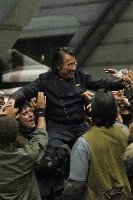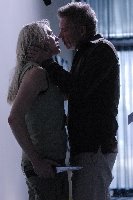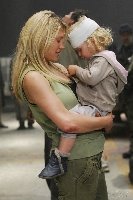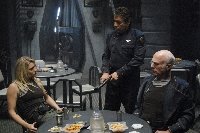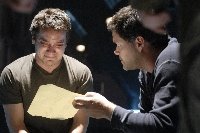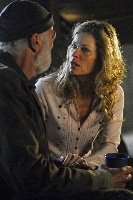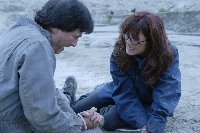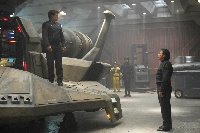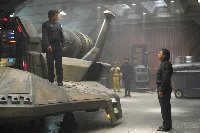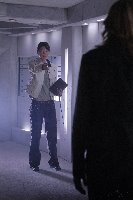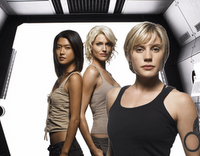
Source:
Baltimore City PaperIt’s not even an argument anymore. While American cinema alternately panders to the appetites of tweens and teens and remakes its own back catalog and trust-fund auteurs churn out arty irrelevancies, television has been in the thick of a new golden age. From Lost and The Wire to Veronica Mars and Battlestar Galactica, television offers programs that consistently entertain, elucidate, experiment, and, as the punk kids used to say, matter.
And so, guns old and new have flocked to television en masse: Peter Bogdanovich (The Sopranos), Mike Figgis (The Sopranos), Quentin Tarantino (C.S.I.), and David Mamet (The Unit) all recently worked in TV, while Bryan Singer, when not franchising X-Men and Superman--what are cinema franchises, with their familiar characters and ongoing story lines, other than TV shows writ humongous?--found time to develop House. And what is at the core of this golden age, aptly for a medium beamed or cabled into your home, is family, even if--especially if--it’s not always immediately recognizable as such.
Television is, of necessity, reflective of its viewers’ desires and perceived reality. Conservatives can make as much noise as they like about reanimating the traditional family to the point of obliterating alternatives; what matters to television is the reality on the ground. And it looks like this: According to Divorce Magazine, the percentage of folks married was, as of 2002, 59 percent of the population, down from 62 percent in 1990. The 2000 U.S. Census Bureau estimated that 13.5 million single parents had custody of 21.7 million children. Single-mother families increased from 7 million in 1990 to 10 million in 2000. Meanwhile, the American Civil Liberties Union, in a 2006 study, found that children raised in families "without fathers, both by lesbian mothers and by single heterosexual mothers," experienced a generally superior parenting experience.
Television depends on either a literal or instinctive grasp of such facts, which in turn helps explain why huge corporations have banked on such wide-ranging single-parent shows as Everwood, Gilmore Girls, Reba, and Supernatural. The success of these shows, assorted queer-themed programs, and HBO’s ironic inverse Big Love--about a polygamist with too much family--underlines the reality: The American family is radically redefining itself in ways immune to traditionalist scolding and wishful thinking.
In another very obvious way, TV’s reflecting nature pops up in the way it deals with post-Sept. 11 fear, helplessness, and government indifference. The CSI variations, Bones, Cold Case, House, Numb3rs, and NCIS serve up an endless array of implacable, invisible enemies that can only be dealt with by experts who buck The System--which is almost always assumed to be incompetent, corrupt, or both.
The finest television combines the problems of increasingly fractured social groupings and external threats and brings them to a fine boil in the cauldron of family. And nothing boils more than Denis Leary and Peter Tolan’s singularly seething Rescue Me. Leary plays Tommy Gavin, an underpaid New York Irish-American firefighter haunted by the ghosts of people he didn’t save at the World Trade Center. An epic drunk, Tommy screws his dead cousin’s wife, kidnaps his own kids, and tries to pummel red-staters out for a grief fix at ground zero. But he’s still a lifesaver, flaws and all.
While arguably an exaggeration--at least to those not raised in Irish-American families--Rescue Me creates an otherwise accurate, enraged, and aching look at the class and cultural stressors fragmenting blue-collar families. So much so that it’s the object of a jihad by the Parents Television Council, led by right-wing scold L. Brent Bozell, the idea apparently being that if you don’t show the truth it’ll go away. But like other shows about fragged families, such as those in Six Feet Under and the monumentally popular Desperate Housewives, Rescue Me reaffirms its audience’s sense of who they are, while offering the solace that their situation may be better in comparison.
Rescue Me’s firefighters constantly rib each other about being queer. While a defensive reaction to the reality of these mainly male firefighters spending most of their time together, it also helps them cope with the fact that they’re each other’s real family, united in mission and values and loyal to the core. And this idea is one only television, with its recurring characters and season-long tales, can do justice to: the metaphorical family unit.
Not just any group of biologically unrelated folks smooshed together constitutes a metaphorical family. While the doctors in House care about one another, they’re too self-immersed to cohere, and anyway, the show mainly exists to watch Hugh Laurie rip patients a new one. Metaphorical TV families, like the real item, are not about one person--or if they appear to be, that person is just an entry point to explore other family issues.
The defining figure of the new metaphorical family may just be Joss Whedon. His Buffy the Vampire Slayer, Angel, and Firefly were often about nothing but the struggles of metaphorical families to define and defend themselves. Look no further than the 2000 episode "Family," in which Buffy’s metaphorical family--blue-collar Xander, father figure Giles, and supernatural sister Dawn--band together to support Tara, the girlfriend of newly out Willow. Tara’s biological father shows up claiming she’ll become a demon if she doesn’t return home. Buffy and the gang reject his craven power play. Infuriated, he says, "We’re her blood kin. Who the hell are you?" Buffy: "We’re family."
"Blood kin" and metaphorical family fuse on Alias, in which double agent Sydney Bristow’s biological father is assimilated into her core family of loyal, beloved co-workers. More subtly, the cops on the wire in The Wire are more intractably connected to each other than their official families, and more overtly, the unrelated hotties of Sex and the City form a family to support their Gotham adventures, as do the queer families of The L Word, Will and Grace, and Queer as Folk. Dead Like Me, meanwhile, took the metaphorical family thing to delightfully ridiculous analogous extremes, with a clan of the deceased--a girl named George, Jewish father figure, slacker brother, and cranky older meter maid often reluctantly pressed into mother duty--easing folks’ passage to the afterlife.
Right now, the two shows that most elegantly fuse external and internal threats to the family--traditional and metaphorical--are unsurprisingly two of the best shows on the small screen: Rob Thomas’ Veronica Mars and Ronald Moore’s Battlestar Galactica. Amateur sleuth Veronica (Kristen Bell) and dad Keith (Enrico Colantoni)--the most realistically positive daughter-father relationship limned in any medium for some time--live in a sunny Southern California town infested with moral rot, racism, and elitist cruelty, a microcosm of Bush America. For all Veronica’s plucky wit and the bedrock relationship between she and Keith, the show is incredibly despairing. The powerful and rotten often get away with their crimes--including Veronica’s rape. Veronica’s efforts to locate the truth are rewarded with smirks from the law and corrupt alike. The show’s most scary element, though, is Veronica’s inability to form an extended family.
Once upper but now barely middle class, she doesn’t fit in with the rich kids, while her dalliances with the few elite teens who aren’t outright bastards earn her the distrust of possible ally Weevil (Francis Capra), a poor Latino biker. And slippery race politics threaten her friendship with her African-American best friend, Wallace (Percy Daggs III). At one almost intolerably painful juncture, you’re led to think that Keith has died--this long after Veronica’s alcoholic mother has abandoned her--and Veronica’s primal weeping against a backdrop of city lights and black sky makes you realize, My God, he’s all she has. Aside from etching a raw line around the limits of the biological family, it makes you realize how much she bears beneath her quips, how alone she is, how brave.
Battlestar Galactica, meanwhile, is the show future media scholars will reference when trying to figure out what the hell was up with America after Sept. 11. It starts with the decimation of humankind courtesy a surprise attack by the man-made slave class of robots and human clones called Cylons. The titular battleship and a small fleet of human survivors spend the show trying to escape the superior Cylon forces.
What creator Moore does with this standard sci-fi armature is brilliant. Most everyone in the Galactica fleet has lost their biological families in the attack, and the show posits the survivors as the ultimate extended metaphorical family. This reading is boldfaced by episodes that play out like the Hatfields and McCoys in space, with the idealistic Galactica "family" up against the cold pragmatists of another surviving ship, the Pegasus. The defining difference between the two: The Pegasus crew tortures their female Cylon prisoner, while the Galactica folks try to figure out why she is what she is. Other contemporary concerns appear in SF drag--mainly, the place of democracy, surveillance, and open debate in times of war. But Battlestar Galactica is most acute in its observations on family and its kissing cousin, identity.
While there’s much to be gleaned about the fluid nature of family in extreme situations from the relationships between Galactica’s Cmdr. Adama (Edward James Olmos) and his surviving son and his dead son’s lover, the location of the show’s central theme is in the body and soul of Sharon (Grace Park)--or rather, the Cylon clone of Sharon.
As a Cylon, the Sharon clone hates humanity for its self-destructive cruelty, but she’s also in love with one of the ship’s pilots, is carrying his child, and constantly sees her belief of humanity as scumbags countered by Adama and company’s decency--and increasingly takes to helping that crew. Will she cave in to the wishes of her Cylon forebears or bond with the Galactica family? More importantly, can she rise above being "born bad" and craft her own viable, independent identity? Stripped of sci-fi metaphor, it’s the classic nature vs. nurture thing with which we all grapple. For the answers or, more likely, even more thorny questions--stay tuned.
Newshound:
Gonzai
 Source: Gateworld
Source: Gateworld